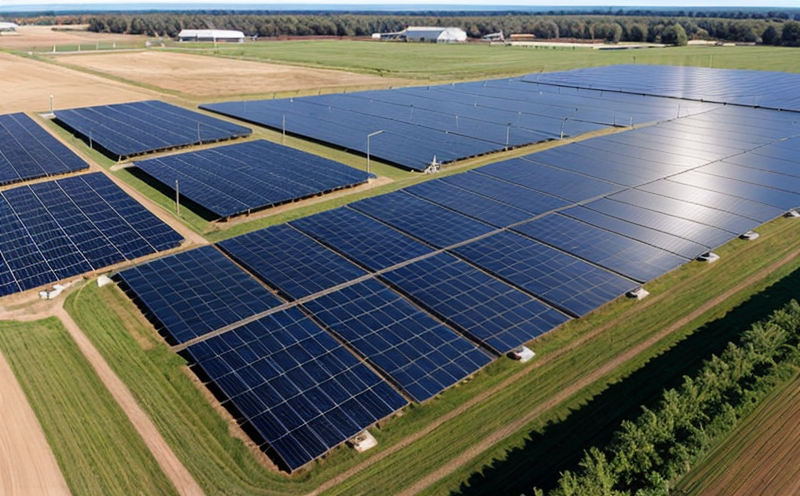IEEE 2030 Interoperability Testing of Smart Renewable Systems
The IEEE P2030.7 Task Group was formed to address the growing need for standards that enhance interoperability in smart renewable systems (SRS). The IEEE Standard P2030.7-2019 provides a framework for ensuring seamless integration between various components of an SRS, including energy storage systems, distributed generation resources, and demand response management systems.
The testing process involves multiple stages to ensure compliance with the standard. This includes validating interoperability across different hardware platforms, software configurations, and communication protocols. The goal is to create a robust ecosystem where renewable technologies can operate efficiently without compatibility issues.
During testing, we simulate real-world scenarios that these systems might encounter in a smart grid environment. These simulations cover various conditions such as varying loads, changing weather patterns, and network outages. By doing so, we ensure that the tested systems perform optimally under all circumstances.
The testing process also involves thorough analysis of performance metrics like efficiency, reliability, and resilience against failures. Compliance with IEEE P2030.7 is critical for ensuring seamless integration into existing infrastructure, thereby enhancing overall grid stability and reliability.
Our team uses advanced tools and technologies to conduct these tests accurately. From state-of-the-art simulation software to comprehensive monitoring equipment, every tool in our arsenal contributes towards achieving precise results. The use of cutting-edge technology ensures that we can replicate even the most complex real-world situations effectively.
The importance of interoperability cannot be overstated in today’s rapidly evolving energy landscape. As more renewable energy sources come online globally, it becomes increasingly important to have standards like IEEE P2030.7 that facilitate easy integration and operation of these systems within existing grids.
By providing comprehensive testing services based on this standard, Eurolab helps clients ensure their products meet the highest quality benchmarks while also promoting broader adoption of renewable technologies worldwide.
Why It Matters
The significance of interoperability in smart renewable systems cannot be underestimated. In an era where sustainability and efficiency are paramount concerns, having standards like IEEE P2030.7 ensures that all components work together harmoniously towards achieving these goals.
Interoperability promotes the seamless integration of diverse technologies into a single network, which is essential for creating resilient and efficient energy systems. This not only enhances grid stability but also supports broader adoption of renewable resources by reducing barriers to entry for new players in the market.
In addition to improving operational efficiency, interoperable systems enable better management of distributed generation assets, leading to reduced costs associated with maintenance and operation. Furthermore, such systems contribute significantly towards achieving environmental targets set forth by international organizations like the United Nations Framework Convention on Climate Change (UNFCCC).
With increasing pressure from regulatory bodies worldwide to shift towards cleaner energy sources, ensuring that all stakeholders involved in renewable technology development adhere to these standards becomes crucial. Compliance with IEEE P2030.7 helps manufacturers demonstrate their commitment to sustainability while also providing them with a competitive edge in the marketplace.
Applied Standards
The IEEE Standard P2030.7-2019 defines guidelines for interoperability between smart renewable systems and other grid components. It focuses on several key areas including communication protocols, data exchange formats, security measures, and testing methodologies.
Communication Protocols: The standard specifies the types of communication interfaces that should be supported by SRS devices to facilitate seamless interaction with other parts of the grid. This includes support for both wired and wireless connections, ensuring flexibility depending on specific requirements.
Data Exchange Formats: Standardizing how data is exchanged between different elements within an SRS is crucial for maintaining consistency across various platforms. The standard defines a set of XML schemas that allow for structured sharing of information related to system status, configuration settings, etc.
Security Measures: Given the critical nature of energy infrastructure, robust security protocols are essential to protect sensitive data from unauthorized access or tampering. IEEE P2030.7 outlines best practices for implementing encryption methods and authentication mechanisms at both hardware and software levels.
Testing Methodologies: Ensuring that all SRS devices meet the required interoperability criteria involves rigorous testing procedures prescribed by this standard. These tests are designed to evaluate performance under different operating conditions, ensuring reliability and compatibility across diverse environments.
Eurolab Advantages
Eurolab offers unparalleled expertise in IEEE P2030.7 compliance testing, providing clients with comprehensive solutions tailored specifically to their needs. Our team comprises highly skilled professionals who stay abreast of the latest developments in renewable technology and standardization efforts.
We possess extensive experience working with various stakeholders involved in the development and deployment of smart renewable systems. This includes utility providers, independent power producers (IPPs), research institutions, and governmental bodies. Through our collaborative approach, we ensure that every aspect of the testing process aligns perfectly with client expectations.
Our state-of-the-art facilities are equipped with advanced tools capable of simulating real-world conditions accurately. With this infrastructure at our disposal, we can perform comprehensive evaluations across multiple dimensions, ensuring thorough coverage without missing any critical details.
In addition to providing reliable test results, Eurolab also offers valuable insights into areas where improvements could be made based on the findings from these tests. This proactive approach helps clients identify potential challenges early on and implement corrective measures promptly before they escalate further.
By leveraging our deep understanding of IEEE P2030.7 standards alongside industry best practices, Eurolab ensures that every project we undertake meets stringent quality benchmarks while also contributing positively towards broader adoption of renewable technologies worldwide.





